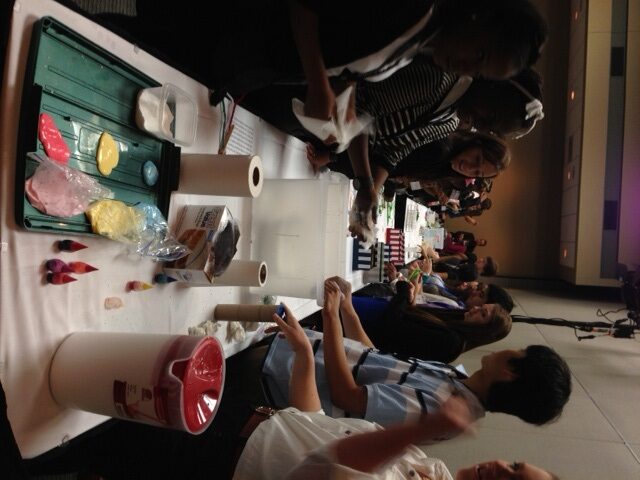Biomedical Engineers Open Field to High School Students

Biomedical engineers are a hybrid of medical and engineering experts. CNN ranked it the “Best job in America” because of high salaries and a sense of giving back to the world.
And largely because of a partnership between Emory and Georgia Tech, Atlanta has become an incubator for the biomedical engineering field.
At the recent Biomedical Engineering Society annual conference at the Georgia World Congress Center, you couldn’t help but notice a lot of young, bright people. Like Renee Bonagura, a Tech undergrad:
“This is a viscoelasticity table, and viscoelastics are non-Newtonian fluids that kind of have properties of elastic and viscous materials.”
English majors can think of it this way: Gloopy glue-like goo, an excellent example of onomatopoeia that looks like a big tub of Elmer’s School Glue.
Move your hand slowly through it, Bonagura explains, and it remains liquid-like. Move quickly, and it hardens.
“Your muscles are actually an example of viscoelastic properties. Because your muscles can get stronger if you put a force through them, which is generally the idea of viscoelasticity.”
It’s also the general idea of this gathering. There are bright minds here from Georgia Tech and Emory. But there are also intelligent young people here from Atlanta high schools.
Georgia Tech bioengineering professor Bob Nerem says it’s important to recognize that talent early-on.
“One of our goals is to help these students to aspire something more than the homes they’re coming out of. Because there are bright students there.”
Organizer Manu Platt is a biomedical engineering professor at Tech and Emory. He says not long ago, he was in the same place as these teenagers.
“I remember growing up being interested in things. And when I finally started to see what was happening in these research labs at local universities, things that I never heard about—things that seemed like science fiction—now I call it science non-fiction. It’s these things we don’t think can happen and we can contribute to until someone shows it to you.”
Solomon McBride is a junior at Atlanta’s B.E.S.T Academy High School. He says the chance to get into a lab and work with a mentor has piqued his interest in the biomedical engineering field.
“We’re getting the opportunity that not a lot of students get. To go out and participate and do these type of things that a lot of people aren’t doing is really nice. I want to continue to do it.”
In June, a select group of 10 students from B.E.S.T Academy and Coretta Scott King Young Women’s Leadership Academy will embark on a 12-month research experience. Professors at Tech and Emory will supervise and act as mentors.
And the fact they’ll get paid — that’s not too bad either.
9(MDAxODM0MDY4MDEyMTY4NDA3MzI3YjkzMw004))





